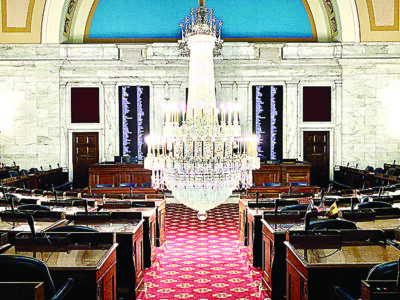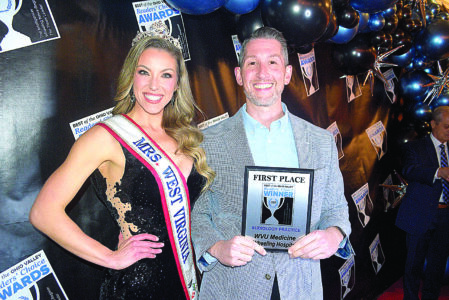Morrisey Considers Special Session For Tax Reform

House of Delegates chamber is lowered for its annual cleaning in preparation for the 2026 legislative session in January.
CHARLESTON — The 2026 legislative session is less than 60 days away, but Gov. Patrick Morrisey is considering calling lawmakers into a special session as soon as December to accelerate cuts to personal income tax rates, though some lawmakers raised concerns about moving too quickly.
According to several sources, Morrisey wants to present lawmakers a tax reform package that could include a 3.88% flat personal income tax rate, which could return as much as $277 million to taxpayers if approved.
To help pay for the proposed tax cut, Morrisey’s proposal would do away with the 100% income tax credit rebate for ad valorem property taxes paid on motor vehicles put in place in 2023 by House Bill 2526, the tax reform package negotiated between the Legislature and former governor Jim Justice. Eliminating the rebate could provide the state between $150 million and $200 million.
State agencies and departments were also asked to submit budget proposals for the fiscal year 2027 general revenue budget – that will be presented to lawmakers at the start of the 2026 regular legislative session beginning Wednesday, Jan. 14 – contemplating at least a 2% reduction from current fiscal year spending.
West Virginia has a graduated personal income tax for individuals and married couples broken into five brackets, with those earning less than $10,000 paying 2.22%, those earning more than $10,000 paying 2.96%, those earning more than $25,000 paying 3.33%, those earning more than $40,000 paying 4.44%, and those earning more than $60,000 paying 4.82%.
When asked Tuesday during a press conference at the State Capitol Building about the possibility of a tax reform special session, Morrisey did not confirm any specific details. But he did confirm that discussions were being had with legislative leadership.
“We are always looking at ways to lower taxes, and I can tell you that that’s what we’re going to be doing, whether it’s now or sometime early next year, I will say that we’re going to keep pushing to do that,” Morrisey said.
“I take seriously that when you bring people together, whether it’s a special session or during the normal legislative session, it’s good to have your I’s dotted and your T’s crossed,” Morrisey continued. “We’re having good conversations with people and I’m very hopeful that we can provide some tax relief to our citizens.”
Through HB 2526, West Virginia cut its personal income tax rates by a combined 21.25% that went into effect retroactive to tax year 2023. Justice and the Legislature passed an additional 2% personal income tax cut in a 2024 special session which into effect Jan. 1, 2025. And a formula within HB 2526 that triggers additional income tax rate cuts put in place a 4% cut that also went into effect at the beginning of 2025.
Personal income tax collections at the end of fiscal year 2025 on June 30 were $2.126 billion, representing nearly 39% of the total $5.519 billion in total tax collections for the general revenue budget in the previous fiscal year. Surplus personal income tax collections accounted for 40% of the $254.8 million surplus at the end of the fiscal year.
Morrisey is on the record supporting the elimination of the personal income tax, though he was critical of the most recent 2% personal income tax cut, saying that the previous administration had failed to cut spending to pay for the cut.
“It’s been my goal for a long time to have tax cuts, and I think you know that, going back to the State of the State and going back to the campaign. But I’ve always said you have to pay for them,” Morrisey said. “We made some real strides last year during the legislative session. The kind of structural changes in the spending discipline that we showed, I think has helped tremendously.”
When Morrisey first took office in January, revenue officials projected a nearly $400 million gap in fiscal year 2026 spending versus revenues in an early six-year budget forecast. The Legislature passed – and Morrisey signed – a $5.323 billion balanced general revenue budget for fiscal year 2026, the current fiscal year which began on July 1 and continues through the end of June 2026.
Morrisey said he is being mindful of financial conditions. The effects of the One Big Beautiful Bill Act on federal funding to the state remain hard to predict, and the recent 43-day federal government shutdown could have negative economic impacts.
“Obviously, we have to always be cautious,” Morrisey said. “We’re going to keep watching the numbers to see what the impact of the shutdown had on the economy and what may occur in the future… A lot of West Virginians are still hurting. They’re hurting from some of the inflation and the high electricity bills. And I’d like to give…people a tax break if I can.”
According to the Tax Foundation’s 2026 State Tax Competitiveness Index, West Virginia ranked 27th for individual income taxes. The only one of West Virginia’s surrounding states with a better ranking was Kentucky at 25th.
“I do not want to have other states gain a competitive advantage over us, because West Virginia needs to lead the region in terms of having the lowest income taxes around,” Morrisey said.
While the state Constitution empowers the governor to call a special session to consider only the bills he places before members, the success of a special session is contingent on whether lawmakers agree to pass the bills being placed before them. Senate Finance Committee Chairman Jason Barrett, R-Berkeley, said legislative support would depend on the details of Morrisey’s proposal.
“We’re always open to the idea of additional tax cuts to reduce the tax burden on all the people of West Virginia,” said Barrett. “We have to make sure that we do that in a fiscally responsible way. Anytime there is a proposal on the table or conversations at least getting started about the potential for tax cuts, we’re certainly interested in having those conversations and that dialogue to see if there is a passport for additional tax cuts for the people of West Virginia.”
But on the other side of the building, House Finance Committee Chairman Vernon Criss, R-Wood, was skeptical about accelerating the end of the personal income tax faster than the trigger formula put in place by HB 2526.
“I believe that it would be ill advised to come in December and try to rush any complicated tax issues through a Legislature that has no information prior to be able to study the proposed plan,” Criss said.
HB 2526, amended in 2024, requires the secretary of the Department of Revenue to determine each August whether a personal income tax cut is triggered based on a formula comparing general revenue collections in a previous fiscal year minus severance tax collections compared to the base year of fiscal year 2019 and tied to the non-seasonally adjusted consumer price index.
If the general revenue collections minus severance tax collections exceed the adjusted base year, a reduction would be triggered for the second taxable year following the determination. Personal income tax rate reductions would be limited to no more than 10 percent during a fiscal year.
“We are in a reduction plan currently for the personal income tax,” Criss said. “That plan has been in place and will continue to be in place. That makes it a prudent decision based upon the real numbers as they have happened, not forecasting what somebody’s general revenue estimates are going to be versus their expenses.
“I believe that we need to stay on path,” Criss continued. “We need to be patient, and we need not to try to accelerate it for the political purposes of some individual trying to advance himself.”
House Minority Leader Pro Tempore Kayla Young, D-Kanawha, also raised concerns with Morrisey’s tax cut proposal, especially if it meant cutting the budgets of state departments and agencies.
“The governor allegedly is asking agencies to make more cuts, after years of a flat budget,” Young said. “That means no raises, no meeting the cost of inflation, no fixing broken equipment or necessary upgrades. We’ve neglected our own agencies and see the results in broken government infrastructure.
“The governor’s proposal highlights the strategy of cutting programs rather than raising revenue in the state,” Young continued. “Cutting the new rebate on the vehicle personal property when folks around the state beg for tangible help is a mistake.”
Fiscal year-to-date general revenue fund collections as of the end of October of $1.789 billion – which includes $706.4 million in personal income tax collections – were 6.1% above the $1.686 billion revenue estimate, providing the state a $102.9 million surplus with eight months left in the current fiscal year. According to the September report from the Department of Revenue, the state has more than $161 million in unappropriated monies in the general revenue fund.
Barrett said additional tax cuts could be possible, but it was key for lawmakers and the governor to make sure spending in the general revenue budget doesn’t exceed 3% per year.
“I think it’s something that’s possible,” Barrett said. “Whether it’s done through increased spending or reduction in revenue, we have to make sure that in the out-years of these tax cuts that it’s something that is done responsibly.”



